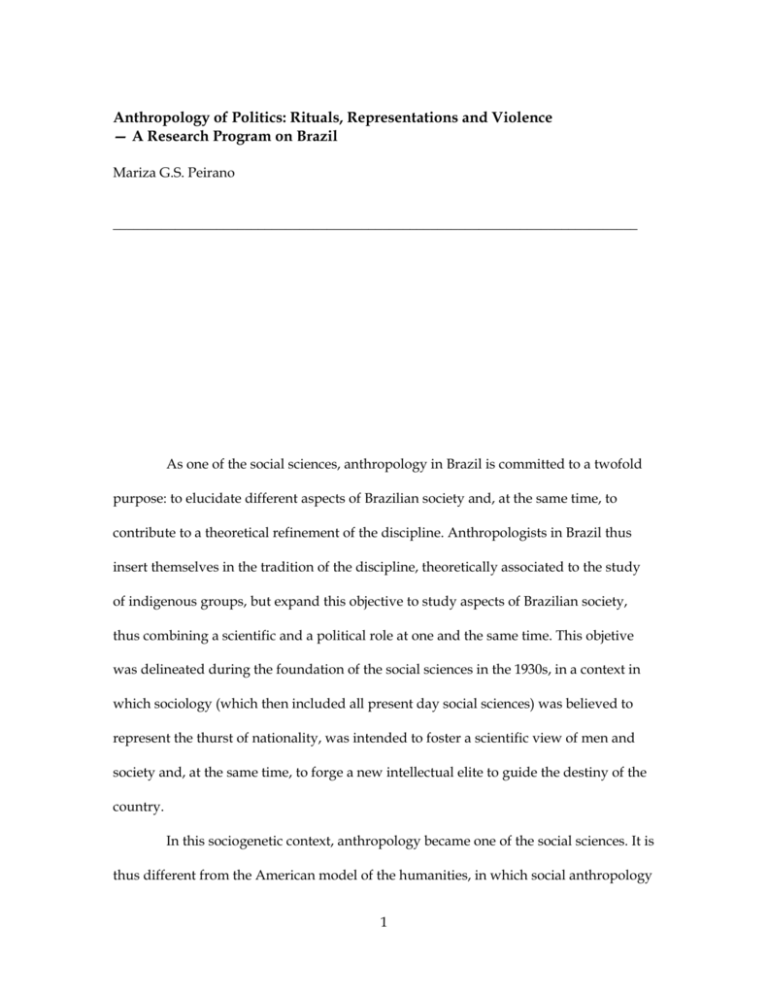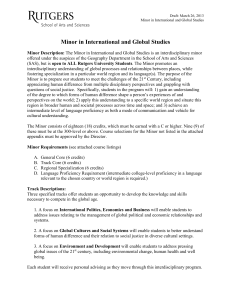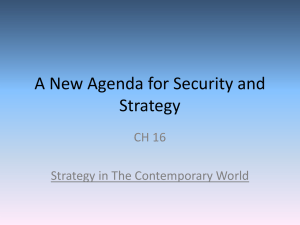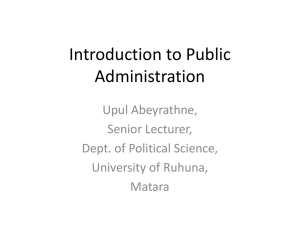Anthropology of Politics: Ritual, Representation
advertisement

Anthropology of Politics: Rituals, Representations and Violence — A Research Program on Brazil Mariza G.S. Peirano ____________________________________________________________________________ As one of the social sciences, anthropology in Brazil is committed to a twofold purpose: to elucidate different aspects of Brazilian society and, at the same time, to contribute to a theoretical refinement of the discipline. Anthropologists in Brazil thus insert themselves in the tradition of the discipline, theoretically associated to the study of indigenous groups, but expand this objective to study aspects of Brazilian society, thus combining a scientific and a political role at one and the same time. This objetive was delineated during the foundation of the social sciences in the 1930s, in a context in which sociology (which then included all present day social sciences) was believed to represent the thurst of nationality, was intended to foster a scientific view of men and society and, at the same time, to forge a new intellectual elite to guide the destiny of the country. In this sociogenetic context, anthropology became one of the social sciences. It is thus different from the American model of the humanities, in which social anthropology 1 finds its niche in a dialogue with archeology, linguistics and biological anthropology, or even the European model in which ethnology converse with ethnography. Due to the historical development of the social sciences in Brazil, anthropology is in a par with sociology and political science, sometimes with history and economics. Compared to other variants, the impulse to look for exotic peoples was never dominant in Brazil. Rather, the idea to look at difference — be it social, cultural, religious, economic —, more than exoticism, has been the basic concern of anthropologists working in the country for the past three decades. It is exactly in this context in which social scientists must assume a (direct or indirect) political role as committed citizens that the research program "Anthropology of Politics: Rituals, Representations and Violence" was launched two years ago, in a joint effort by social scientists from Museu Nacional/Universidade Federal do Rio de Janeiro, Universidade de Brasília and Universidade Federal do Ceará, including a number of approximately 30 researchers at different stages of their professional life. Rather than allow the overall ideology to attach unsuspectedly to the research, the aim of this program is to focus precisely on native conceptions and practices of politics themselves, combining at once an ethnographic and a comparative perspective. The program emphasizes events and situations in which, from the native's point of view, things political are in action, and includes comparison within and outside Brazil. Rituals The analysis of politics as ritual events, as the sphere of contextualized committed action, puts together the perspective that places emphasis on the behavior and vocation of those who act in the political sphere with the perspective that perceives of politics as a social domain. 2 As an example of this approach, research on the National Congress includes the analysis of events involving Congressional censure and removal from office for breach of parliamentary docurum, processes which reveal the general notion of honour in politics, its specific connotations in the Brazilian context, the borderline between the political and juridical domains and the performative character of actions or individual actors who are able to detect the subtle codes of political effectiveness. Similar or analogous dimensions may be identified in ethnographic analysis of electoral processes in small municipalies, where the value-laden centrality of the political person reveals the native perception of politics as an inclusive social milieu, even though often the relevant ideological universe of analysis is delimited in such a way that presidential elections, for instance, are of little significance. The constitution of a citizenry guided by the ideal of equality, with symbolic echoes from the history of Christianity while expressing a set of modern ideals which incorporate the struggle for rights and justice is one of the central objectives of the long ritual that was the march of the Landless Rural Workers Movement (MST) during the two months that preceded April 17, 1997. A detailed analysis of the march reveals that it is a privileged site of investigation in condensing planes of social meaning as well as constituting itself as a specific model of doing politics and creating social identity (in contrast with other actions of the same social movement). Representations Studies carried on up to now have concentrated on electoral moments (rather than formal electoral processes), political institutions of a parliamentary type (National Congress, council chambers, popular councils etc.), public bureaucracies, and the political action of unions or popular movements. Sometimes the main strategy is aimed 3 at overlapping a set of questions (as, for example, electoral participation of unions to actual elections within unions). Other times, at investigating the relations between politics and the time of politics (how does a group which classifiees itself as non-political act in a way socially recognized as political?). At other times, it intends at openning up new fronts for research (the action and representations of government organizations and NGOs, concerning issues such as the environment, international politics, or the political sociability of religious groups). Other research topics include the identification of social resources activated by municipal mayors in their effort to obtain financial resources from federal institutions. The existing literature focuses its attention to the relations which these and other local political leaders have with their subordinates; at present the research aims to grasp their bottom-up relations, with congressmen, ministers and bureaucrats or other intermediaries. Violence The project proposes the study of events associated with political violence, public events which have consequences in the redefinition of legally sanctioned social identities, or in access to public positions and capital. Special attention is given to the temporality of violence in politics, and to the different conceptions of politics expressed in the actual history of violence in Brazil. Social and cultural conditions which allow these events to occur are focused: factional struggle or assassination-to-order and the world of reciprocity; the representation of the bandit-hero and the value of honour; the microwolds of pistolagem (shootings by hired gunmen or pistoleiros), of the organs of public security, of the political, legal and journalistic fields; the social conditions which make party militants perceive the use of 4 violence as a legitimate way to conduct politics; and the more general mechanisms of violent politicization of social and cultural life. Publications As a result of this research program, the following books have been published so far: A Honra da Política. Decoro Parlamentar e Cassação de Mandato no Congresso Nacional (19491994), by Carla Costa Teixeira (1998); Chuva de Papéis: Ritos e Símbolos de Campanhas Eleitorais no Brasil, by Irlys Barreira (1998); Crimes por Encomenda. Violência e Pistolagem no Cenário Brasileiro, by César Barreira (1998); Em Nome das Bases: Política, Favor e Dependência Pessoal, by Marcos Otávio Bezerra (1999); Fazendo a Luta. Sociabilidade, Falas e Rituais nas Organizações Camponesas, by John Cunha Comerford (1999); Carisma, Sociedade e Política. Novas Linguagens do Religioso e do Político, by Júlia Miranda (1999); Alguma Antropologia, by Marcio Goldman (1999). All books are part of the collection "Antropologia da Política" and were published by Editora Relume-Dumará, Rio de Janeiro. The books may be found at the library system of Columbia University. _________________________ Mariza G.S. Peirano is the present Rio Branco Professor at ILAIS for 1999. She is Professor of Anthropology at the Universidade de Brasília, Brazil, and the author of A Antropologia no Plural: Três Experiências Contemporâneas (1992), A Favor da Etnografia (1995). Her more recent articles in English include "When anthropology is at home: the different contexts of a single discipline" (Annual Review of Anthropology, vol. 27, 1998) and "The pursuit of anthropology" (Indian Social Science Review, vol. 1, 1999). This Fall, she is offering a seminar at the Department of Anthropology at Columbia, in which students discuss both recent work done by social scientists in Brazil (on such different topics as the study of the contact with Indian populations, race relations, music as symbol of Brazilian identity, the social place of carnival and other festivities, etc.), the role social scientists in Brazil have as committed citizens, and their quest for theoretical excellence. At present, her major research project focuses on "Rituals of Politics", as part of the research program outlined above. 5









